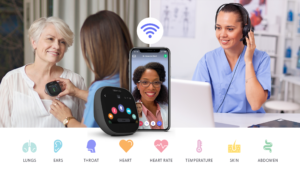Fourth Trust adopts TytoCare device
Posted: 29th July 2021
The TytoCare remote monitoring device is continuing to expand its service delivery across the region after Sheffield Children’s NHS FT became the fourth major NHS Trust to pilot the technology. 
The Yorkshire & Humber AHSN has been working with its partners at South Yorkshire & Bassetlaw Integrated Care System (ICS) to spread the uptake of TytoCare’s handheld device that allows patients and their families to perform medical examinations anytime, anywhere for a range of health conditions. It can also be used by healthcare professionals to provide virtual consultation capabilities in a clinical or community setting.
Clinicians at Sheffield Children’s NHS FT are using TytoCare devices for its Home Ventilation Virtual Clinic to undertake physical checks during community visits as well as facilitate online remote consultations and examinations.
Sheffield Children’s NHS FT also plans to deploy the TytoCare devices to its Paediatric Palliative Care Team so that more children and families can benefit from enhanced virtual support at home and avoid travel to and from the hospital.
Jude Stone, Associate Director for Transformation at Sheffield Children’s NHS FT, said: “Health innovation is vital in order for our health and care system to evolve. I am therefore delighted to be able to work with the Yorkshire & Humber AHSN to trial new digital solutions that not only helps us to provide even better care but also improves the overall patient experience for children and their families during what is an extremely difficult time in their lives.”
Sheffield Children’s NHS FT is the fourth site to be adopting remote monitoring technology after the cleft lip and palate service at Leeds Teaching Hospital NHS Trust, Affinity Care Primary Care Network in Bradford and Airedale NHS FT Care Homes introduced TytoCare into their care pathways.
Twenty-six projects spanning across 14 different healthcare organisations in Yorkshire and the Humber are set to pilot the TytoCare device in a variety of settings, including care homes.
Due to the pandemic, care homes were limiting in-person GP visits and consultations to reduce the risk of transmission to residents, and to minimise the time practitioners need to travel to and from the homes.
TytoCare offers care homes enhanced capabilities for virtual consultations, enabling physicians to facilitate a more thorough level of clinical assessment and better clinical decision making, without the need for an in-person assessment of the patient.
The integration of TytoCare empowers care home staff to better support the healthcare needs of their residents, while improving the residents’ experience through better managing their health needs in the home.
Dedi Gilad, CEO and Co-Founder of TytoCare, said: “We are honoured that the NHS has chosen to implement our telehealth solution across NHS trusts. TytoCare’s solutions deliver convenient and accessible healthcare without compromising quality, all from the comfort of home. We look forward to continuing our work with the NHS to expand its incredible telehealth programs across the UK.”
The Yorkshire & Humber AHSN has been working closely with TytoCare and with its partners in the local Integrated Care Systems, to maximise its knowledge of and relationships within the health sector to support the adoption and spread of the TytoCare solution across the healthcare system. After noticing the technology during its initial pilot in Bradford, the Yorkshire & Humber AHSN advocated for it to be part of NHSx’s Joined-Up Care Programme.
Kate Lodge, Head of Strategic Partnerships at the Yorkshire & Humber AHSN, said: “We’re thrilled to provide the TytoCare solution to 14 different trusts, across 26 projects, ensuring patients are getting the best possible care digitally and reducing the need for hospital admissions.
“We look forward to continuing our journey of digital innovation with TytoCare, providing all patients, from babies to the elderly, with comprehensive virtual care, as well as giving clinicians the tools needed to properly care for, diagnose, and treat patients remotely.”
